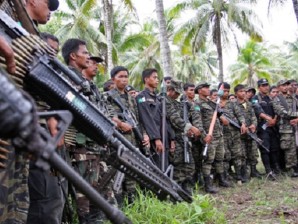Military hopes for respite soon in decades of warfare
MANILA, Philippines—At war for decades, the Armed Forces of the Philippines sees partial relief for its battle-weary soldiers if the government seals a peace accord with the Moro Islamic Liberation Front.
Military spokesperson Colonel Arnulfo Burgos said Wednesday that an end in the decades-old Moro insurgency in Mindanao would leave the AFP having to deal only with the New People’s Army, the armed wing of the Communist Party of the Philippines. The communist insurgency, which began a few years after the end of World War II, is the longest running in Asia.
Government officials and MILF rebels have begun a fresh round of talks in Kuala Lumpur, Malaysia to work out the framework of an agreement that would outline the steps, or roadmap, to a final peace pact.
Burgos said “it means a lot” that there has not been a single skirmish between soldiers and MILF fighters since January as both sides work in support of the peace process.
With a peace pact between the government and the MILF, Burgos said, “the AFP can also dedicate our other forces toward nation-building activities…. This will pave the way to fulfillment of the objectives of the IPSP (Internal Peace and Security Plan) Bayanihan, which intends to have a slow transition from internal security operations to territorial defense or external defense by 2014.”
Article continues after this advertisementAt its peak, the MILF had some 10,000 fighters, said Burgos
Article continues after this advertisementHowever, Burgos said, the Bangsamoro Islamic Freedom Fighters, a breakaway group of the MILF led by Ameril Ombra Kato, remains a “security concern.”
“We take everything very seriously. Although the (BIFF) is not the biggest threat to [our security], we devote efforts on it,” Burgos said, adding that the AFP remains “proactive” in dealing with the BIFF such as the conduct of security patrols and intelligence gathering.
Burgos said that the NPA remains the main security threat “in terms of numbers” and the areas from which the communist insurgents receive funding. From a high of 25,000 in the 1980s, there are about 4,000 NPA rebels today, Burgos said.
